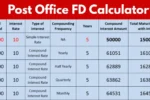Considered a much-needed pay hike by the 8th Pay Commission 2025 for the central government employees, a discussion had indeed started regarding a proposed 92% increase in the minimum salary. This has created widespread excitement amongst the public sector employees, pensioners, and their kin. This new pay scale is to give salaries life against inflation, apt worth, and backing for the financial sustenance of a big number of employees who serve in various government departments.
Proposed Salary Increase and Its Effect
Reportedly, under the 8th Pay Commission, the basic minimum pay is to be significantly raised for central government employees. For instance, an entry-level employee earning ₹18,000 per month presently may expect the basic pay, with an almost 92% increase, to rise close to ₹34,500. Higher grade employees and officers will also be substantially increased, thus ensuring greater parity among different layers of government services. This pay revision stands to improve the general living requirements for government employees.
Allowances and Perks for Financial Security
Along with the basic pay-rise, some of the allowances and benefits are also going to be revised by this Commission. The allowances under consideration for the revision are Dearness Allowance (DA), House Rent Allowance (HRA), Transport Allowance, and special allowances. Allowances are expected to be revised so as to compensate the increase in the cost of living, especially in metros where housing, transportation, and daily expenses are very high. Better pension schemes for those retiring are also expected so that the pensioners have enhanced financial security during their post-retirement years.
Implementation Timeline
The government has indicated that the 8th Pay Commission recommendations will be implemented in a phased manner so that the revised pay structure shall probably come into force from April 2025. There will be enough time for departments to adjust their budget allocations and ensure smooth disbursement of salaries. Pensioners shall also benefit from the retroactive payments, thereby making it a just and transparent transition for all concerned.
Economic and Social Implications
An increase in salaries, as envisaged by the 8th Pay Commission, would spur consumer spending, benefiting retail, real estate, and services. Higher salaries would provide greater disposable income to departmental employees and their families to be used for increasing economic development. Socially, the raise also signifies due recognition of the 8th.pay of their services and an attempt to motivate them further.
Conclusion
The 8th Pay Commission 2025 is all set to bring a blessing in disguise to the central government employees in monetary terms. With a proposed minimum salary jump of 92%, better allowances, and improvements in pension, this pay revision will go a long way in improving the earnings of millions of employees and retirees. This shall mark a supreme milestone for the just compensation and financial security of India’s public sector workforce.




